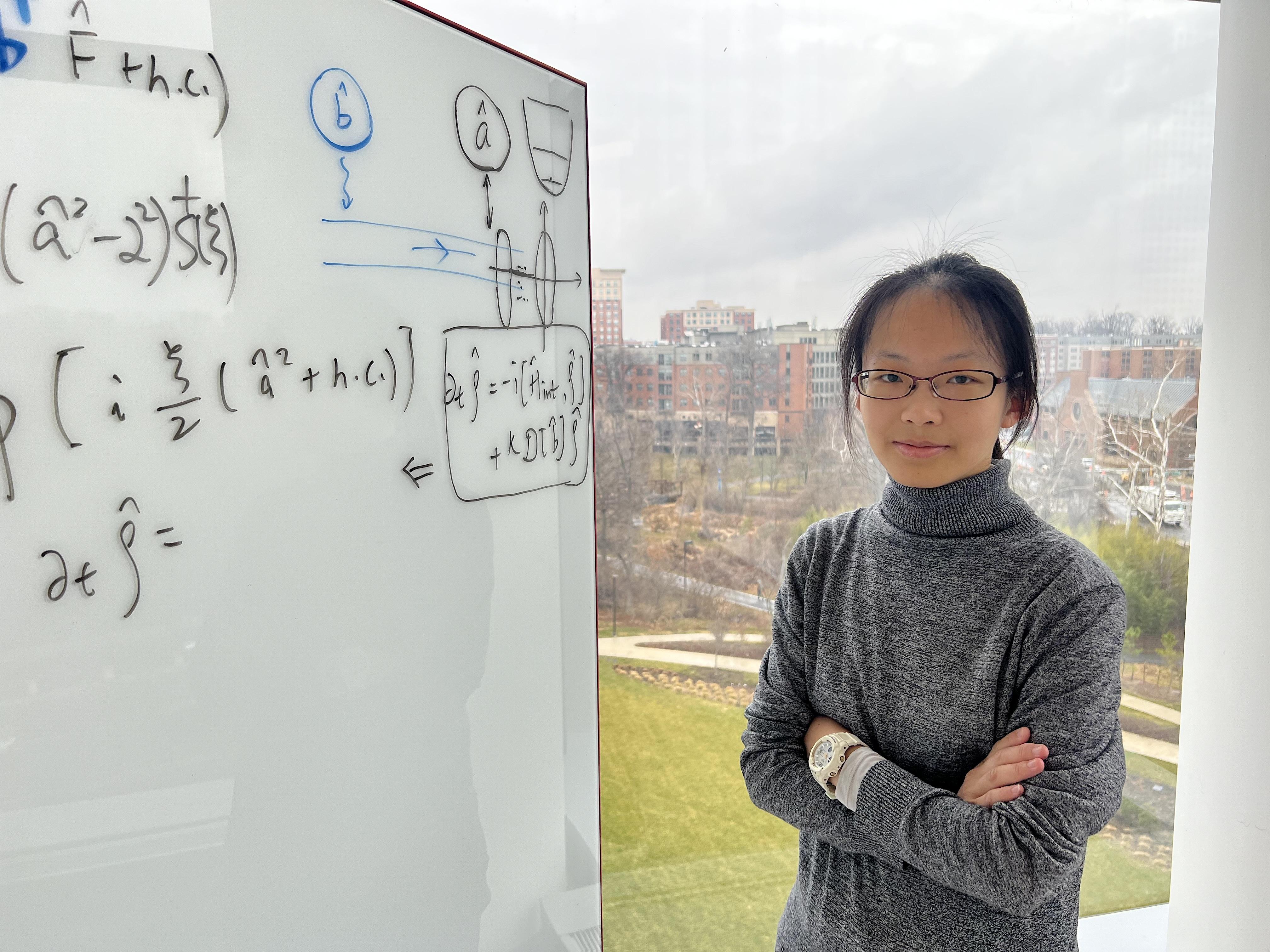
In the quantum world, quantum noise is like the whispers of unpredictability. It’s the tiny fluctuations that happen erratically, coming from how particles behave on the smallest of scales. Despite being puzzling, studying these fluctuations is key to making better quantum technologies like computers and communication systems. It also provides a glimpse into how the universe works on its most fundamental level.
Yuxin Wang, one of the newest Hartree Postdoctoral Fellows at the Joint Center for Quantum Information and Computer Science (QuICS), has devoted her research to understanding noise in quantum systems. This includes unwanted noise in realistic quantum devices, as well as engineered noise that scientists introduce to better understand exotic and useful dynamics that would not be possible in a “noise-free” setting.
The overarching goal of her research is two-fold, Wang says. First, it aims to build a bridge between abstract and idealized theoretical ideas of how quantum machines can be powerful and useful. Second, it seeks to address the challenges posed by real-world devices, which are susceptible to noisy surroundings.
Before quantum noise began whispering in Wang’s ear, she was first drawn into the quantum realm as an undergraduate physics major at Peking University when she learned about quantum teleportation.
Unlike the kind of teleportation that happens in science fiction shows like “Star Trek,” quantum teleportation is a way of transferring the state of one particle to another, using entanglement and classical communication. It is like making an identical copy of a particle in a different location without physically moving it.
“I was immediately hooked, because it is a problem that can be described using relatively simple mathematical terms—all you need to know is basic linear algebra—and yet its physical implications are so profound and seemingly against our intuition about the physical world,” says Wang, who majored in physics. “I think to some extent that still is a driving force behind my research, to hopefully find simple mathematical language to explain novel phenomena at both the theoretical and experimental level.”
Her burgeoning interest in the field led her to pursue a Ph.D. in quantum engineering at the University of Chicago, where she was advised by Aashish Clerk, a professor of molecular engineering. She says Clerk’s course on quantum dissipation and measurement is what sparked her keen interest in noise mitigation in quantum sensors.
While at the University of Chicago, Wang—who considers herself a theoretical physicist—also worked with experimentalists, which are scientists that specialize in conducting experiments to test hypotheses and validate theories.
Experimental research typically progresses at very different—usually longer—time scales compared with theoretical research, Wang says. She saw that her experimentalist friends might often face setbacks such as equipment issues that would be unimaginable to theory people.
“It can be a bit frustrating at times, but it also feels amazing to be part of a collective effort when things all come together by the end,” she says.
By the end of her Ph.D., Wang says she wanted to keep doing theory related to quantum information science, but also wanted to broaden the scope of her research. She says QuICS is the perfect place to fulfill this purpose, as it offers a great amount of diversity in terms of research themes.
“Another unique feature about QuICS is its interdisciplinary nature—I can very easily talk with experts from very diverse fields who all share an interest in quantum,” she says. “The Hartree Fellowship also provides me with a lot of freedom to explore different research directions.”
Wang is currently working with QuICS Fellow Alexey Gorshkov and Mohammad Hafezi, an affiliate Fellow. She says she is amazed by the scope of research being done by both groups. For example, during meetings with Gorshkov’s research group, Wang says they could be exploring multiple topics simultaneously, including high-precision measurement beyond the classical limit, using a quantum computer to simulate complex high-energy scattering processes, how to reduce error in a near-term quantum computer, and quantum reference frames.
Gorshkov, an adjunct professor of physics and a physicist at the National Institute of Standards and Technology (NIST), says he is very impressed by the breadth of Wang’s knowledge.
Soon after arriving at UMD, Wang attended a meeting where Gorshkov and others had been attempting to solve a challenging open problem related to entanglement in Guassian boson sampling. The very next week, she showed the group how to solve it.
“Out of all the postdocs I have interacted with so far at the university, Yuxin was able to start contributing to existing research projects the fastest,” says Gorshkov, who also holds an adjunct appointment in UMD’s Institute for Advanced Computer Studies (UMIACS).
After QuICS, Wang plans to continue performing research in theoretical quantum science, most likely in an academic environment.
“I hope to work in an environment that would allow me to continue pursuing my curiosities and passion about quantum theory and see how that can be leveraged to discover novel physical phenomena and enable applications in the lab,” she says.
—Story by Melissa Brachfeld, UMIACS communications group
About the Hartree Fellowship
QuICS offers two-year Hartree Fellowships to exceptional candidates interested in quantum information science and quantum computing. The fellowship is named for Douglas Hartree, a scientist at the National Institute of Standards and Technology (NIST) in the mid-1900s who made substantial contributions to physics and computer science.
About QuICS
QuICS is a partnership between the University of Maryland and NIST. Located just outside of Washington, D.C. on the UMD campus, the center advances research and education in quantum computer science and quantum information theory. QuICS receives its technical and administrative support from UMIACS.